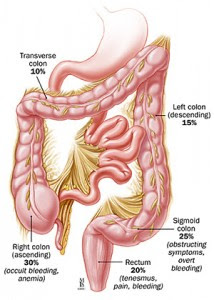The colon is part of the body’s digestive system. The first 6 feet of the large intestine are called the large bowel or colon. Age and health history can affect the risk of developing colon cancer.
A family history of cancer of the colon or rectum.
A personal history of cancer of the colon, rectum, ovary, endometrium, or breast.
Certain hereditary conditions, such as familial adenomatous polyposis and hereditary nonpolyposis colon cancer (HNPCC; Lynch Syndrome).
Possible signs of colon cancer include a change in bowel habits or blood in the stool.
These and other symptoms may be caused by colon cancer. Tests that examine the rectum, rectal tissue, and blood are used to detect (find) and diagnose colon cancer.
Sigmoidoscopy: A procedure to look inside the rectum and sigmoid (lower) colon for polyps (small pieces of bulging tissue), abnormal areas, or cancer. Colonoscopy: A procedure to look inside the rectum and colon for polyps, abnormal areas, or cancer. The stage of the cancer (whether the cancer is in the inner lining of the colon only, involves the whole colon, or has spread to other places in the body).
Whether the cancer has blocked or created a hole in the colon.
Whether the cancer has recurred.
The stage of the cancer.
Whether the cancer has recurred.
**Treatments and drugs
The type of treatment your doctor recommends will depend largely on the stage of your cancer. The three primary treatment options are: surgery, chemotherapy and radiation.
Surgery (colectomy) is the main treatment for colorectal cancer. Surgical procedures
Your surgeon removes the part of your colon that contains the cancer, along with a margin of normal tissue on either side of the cancer to help ensure that no cancer is left behind. Nearby lymph nodes are usually also removed and tested for cancer. Side effects of colon cancer surgery may include short-term pain and tenderness, and temporary constipation or diarrhea. Some larger polyps may be removed using laparoscopic surgery. Chemotherapy
Chemotherapy uses drugs to destroy cancer cells. Chemotherapy can be used to destroy cancer cells after surgery, to control tumor growth or to relieve symptoms of colon cancer. Your doctor may recommend chemotherapy if your cancer has spread beyond the wall of the colon.
Radiation therapy
Radiation therapy uses powerful energy sources, such as X-rays, to kill any cancer cells that might remain after surgery, to shrink large tumors before an operation so that they can be removed more easily, or to relieve symptoms of colon cancer and rectal cancer.
Radiation therapy is rarely used in early stage colon cancer, but is a routine part of treating early stage rectal cancer, especially if the cancer has penetrated through the wall of the rectum or traveled to nearby lymph nodes. Targeted drug therapy
Three drugs that target specific defects that allow cancer cells to proliferate are available to people with advanced colon cancer.







No comments:
Post a Comment